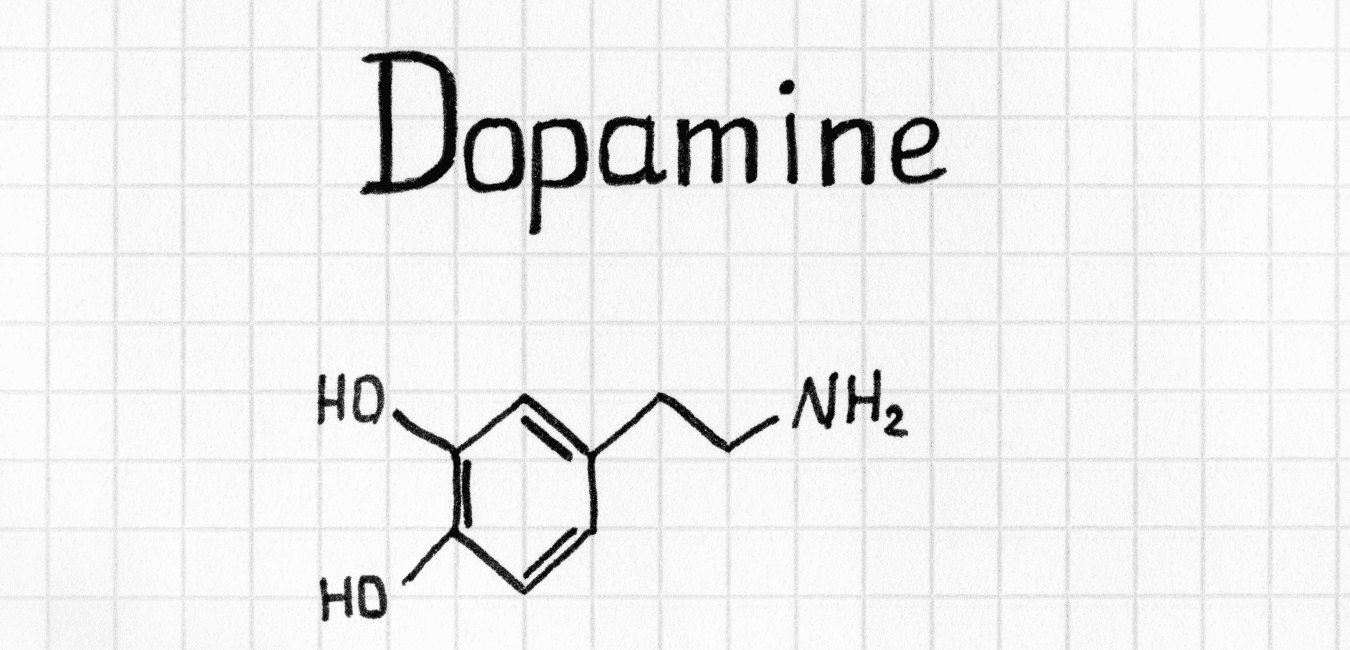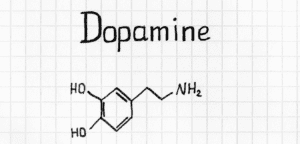
Dopamine is a neurotransmitter that is released in certain regions of the brain. It regulates things like movement, emotion, cognition, motivation, and pleasure.
If you are experiencing low dopamine levels at any time in your life, there are many natural ways to increase it.
In this blog post, I will discuss 10 different ways to naturally repair your dopamine levels!
So without further ado, let's get right into it.
An Overview – The Neurobiology of Addiction and Dopamine
Dopamine is often referred to as the "molecule of addiction," since it has a very strong impact on our brain's pleasure and motivation systems.
Dopamine functions in the brain to motivate you to accomplish things that will help you survive and pass on your genes. It pushes you to seek potential benefits.
According to studies, dopamine levels are higher in highly-motivated individuals, and low dopamine levels are linked to lack of motivation, ADHD, and anhedonia.
It is also thought that dopamine dysfunction can trigger pathological behaviors like drug addiction, gambling addiction, and hypersexuality.
Dopamine-spiking behaviors, such as:
- Gambling
- Junk food
- Sex
- Music
... And so on, can cause desensitization and downregulation (decrease in sensitivity and number) of dopamine receptors.
Especially those that maintain dopamine levels elevated consistently, such as cocaine users.
This is why, in the example of frequent drug use (even caffeine), greater dosages are required to achieve the same impact and pleasure.
Receptors become sensitized to that stimulus, and you develop a tolerance.
What The Research Suggests About Low Dopamine Levels

The fact of the matter is there are many studies linking low dopamine levels to depression.
For example, one study found that depressed individuals had up to 64% lower levels of dopamine metabolites in their cerebrospinal fluid (CSF).
Additionally, other studies have shown that depressed individuals tend to have lower levels of Dopamine transporters as well.
Even more interesting is the fact that low dopamine levels are associated with many of the symptoms commonly seen in depression.
For example, one study found that patients diagnosed with major depressive disorder had significantly reduced levels of dopamine metabolites.
Another study found that depressed patients tend to have lower concentrations in their CSF, which suggests that low Dopamine levels correlate with depression severity.
Finally, one animal model of depression has shown that rats exposed to stressors developed a reduction in dopamine receptor density and function due to stress.
There are many ways in which to naturally increase dopamine levels, but it is important that you choose the right method for your specific needs.
Let's take a look at the 10 most common ways to increase dopamine levels naturally.
10. Uridine
Uridine is a chemical that is involved in the synthesis of phosphatidylcholine and sphingomyelin, which are important components within your cell membranes.
It also plays an integral role in synthesizing deoxyribonucleic acid (DNA) and ribonucleic acid (RNA).
Including adequate levels of uridine in your diet can help to maintain healthy dopamine receptor function and protect against deficiencies associated with low dopamine activity or diseases such as Parkinson's Disease (PD).
Uridine is found mainly in beets, wheat bran, brewer's yeast, sugar cane molasses, raw fish, and tomatoes.
The best way to get uridine into your diet is by consuming beets on a regular basis or supplementing with Uridine monophosphate which is available at most health food stores.
9. Forskolin
Forskolin is found in the roots of a plant that is native to India and other parts of Asia, Coleus forskohlii.
Forskolin increases production levels of cyclic adenosine monophosphate (cAMP), which activates protein kinase A and stimulates dopamine receptor sites on your neurons.
In fact, research has shown that forskolin may be just as effective in treating PD symptoms as the drug levodopa, but without all of the negative side effects.
When it comes to dopamine regulation and receptor activity, forskolin has been shown to work in a similar way as some dopamine medications.
Forskolin is available at most health food stores or online; however, it's important that you check with your doctor before taking this supplement since there may be contraindications with other drugs you're currently using.
8. Sulbutiamine
Sulbutiamine is a synthetic derivative of thiamine, also known as vitamin B-1.
It helps to increase dopamine levels in your brain by crossing the blood-brain barrier and binding with GABA receptors, which inhibit nerve impulses that stimulate anxiety or stress hormones such as cortisol.
Sulbutiamine has been shown to improve mental clarity, mood, and memory, as well as increase your energy levels.
However, it's important to note that this is a synthetic supplement and may not have the same effects on dopamine receptors as other B-vitamins which are found naturally in food sources such as bananas or legumes.
Sulbutiamine can be purchased online at most health food stores.
7. Inositol
Inositol is a vitamin B8 that occurs naturally in foods like cantaloupe, citrus fruit, and sunflower seeds.
It's also found in supplemental form and is used to treat a variety of mental disorders including:
- Depression
- Panic disorder
- Obsessive-compulsive disorder (OCD)
- Bulimia nervosa
- Postpartum depression
- Bipolar disorder
- Attention deficit hyperactivity disorder (ADHD)
Inositol functions as an "insulin mimicker" which means it activates the same receptors in your brain as insulin does, which explains why Inositol helps to regulate blood sugar levels and can help with symptoms associated with diabetes.
Inositol also plays a role in stimulating dopamine receptor sites on neurons throughout your central nervous system.
6. CDP-Choline (Citicoline)
Citicoline also known as CDP-Choline (cytidine diphosphate choline), stimulates dopamine receptor activity which can help with brain functions such as memory, learning, and reasoning.
Choline is a nutrient that is essential for the growth and development of your brain.
It helps to support communication between neurons, as well as create neurotransmitters such as acetylcholine which is important for memory and learning functions.
When it comes to dopamine levels and receptor activity, research has shown that CDP-Choline can help to increase dopamine levels in your brain by blocking the activity of an enzyme called Phospholipase-D.
In addition to supplementing directly with CDP-Choline, choline is also found in many foods including soy products, eggs, liver, and peanuts.
Citicoline can be purchased online at most health food stores and is considered a safe supplement with few side effects.
5. ALCAR (Acetyl-L-Carnitine)
ALCAR (acetyl-L-carnitine) is an amino acid that stimulates dopamine receptor activity and helps to protect brain cells from damage.
It's also important for cellular energy production by transporting fatty acids into the mitochondria where they're burned as fuel, which supports mental alertness and memory functions.
When it comes to dopamine receptors and neurotransmitters, ALCAR is also known as a powerful antioxidant that helps to prevent oxidative stress.
Oxidative stress can occur when there is too much "free radical" activity in the brain.
Free radicals are highly reactive chemicals that can damage your cells and DNA, which increases the risk of certain neurological diseases such as Alzheimer's or Parkinson's disease.
ALCAR has been shown to increase dopamine receptor sites by protecting them from free radical damage.
It can be purchased online at most health food stores and is considered a safe supplement with few side effects.
4. Cordyceps
Cordyceps mushrooms are found in supplement form and used to improve energy levels, enhance mood, increase sexual function, build muscle mass, reduce fatigue.
Cordyceps mushrooms have also been shown to stimulate dopamine receptor activity which can help with symptoms associated with Parkinson's disease such as:
- Slowed movement
- Muscle stiffness
- Tremors
In recent research, cordyceps were found to be a powerful antioxidant that helps protect dopamine receptor sites from oxidative stress and free radical damage.
Cordyceps can be purchased online at most health food stores or Asian markets as powder, extract, or capsule forms.
3. Meditation
Meditation is not only for religious or spiritual contemplation.
Studies have found that meditation can increase dopamine levels by as much as 50% and help to stimulate dopamine receptor sites in your brain which improves focus, concentration, memory, creativity, motivation, and overall mood.
In addition to its effect on neurotransmitters such as dopamine, research has also shown how the practice of meditation can actually change the structure of your brain by growing gray matter and creating new neural connections.
Daily meditation practice will not only help to stimulate dopamine receptor sites but also reduce stress which is another common cause for low levels of this neurotransmitter.
You don't need any special equipment or a lot of time in order to meditate.
If you can spare five to ten minutes per day, simply find a quiet place where you can sit or lay down comfortably and focus on your breath as it goes in and out of your body.
When thoughts come up that distract you from staying focused on your breathing, just notice them without judgment before letting them go, and then gently return your attention to your breath.
You can purchase guided meditation videos online or find them for free on YouTube with keywords like:
- Mindfulness
- Awareness
- Breathing exercises
- Yoga and meditation
There are also many apps available such as Sam Harris's "Waking Up" app, which offers guided meditations specifically designed for beginners.
2. Exercise
Exercise is an excellent method to naturally increase dopamine levels.
It's a natural reward that creates distinct changes in the mesolimbic and nigrostriatal dopamine pathways.
Similar to meditation, exercise also stimulates the release of neurotransmitters like, serotonin, and norepinephrine which improve your mood reduce stress levels, increase confidence and motivation.
In addition to its effect on neurochemicals such as dopamine, studies have found that regular aerobic activity can actually increase brain volume in various regions including the hippocampus which is responsible for long-term memory formation.
Even just walking for 20 minutes per day can help to increase dopamine levels and activate dopamine receptors in your brain.
Exercise also increases blood flow to the brain which helps with mental clarity, focus, and concentration.
You don't need any special equipment or a lot of time in order to exercise.
Just start by parking further away from your destination when you go shopping or take an extra 15-minute walk during lunch break at work.
That's literally all it takes to start reaping the benefits.
1. Sunlight
Exposure to sunlight stimulates the release of serotonin and dopamine, which helps to improve your mood.
Sunlight also triggers the release of vitamin D in your skin, which does a lot more than just produce happy brain chemicals.
Vitamin D has been shown to reduce inflammation and boost immune function, both of which can help prevent depression and anxiety disorders.
Sunshine appears to have an effect on the dopaminergic system as a whole, with increased striatal D2 and D3 dopamine receptor availability being observed in study subjects.
source https://nootropicology.com/dopamine-receptor-repair/

No comments:
Post a Comment